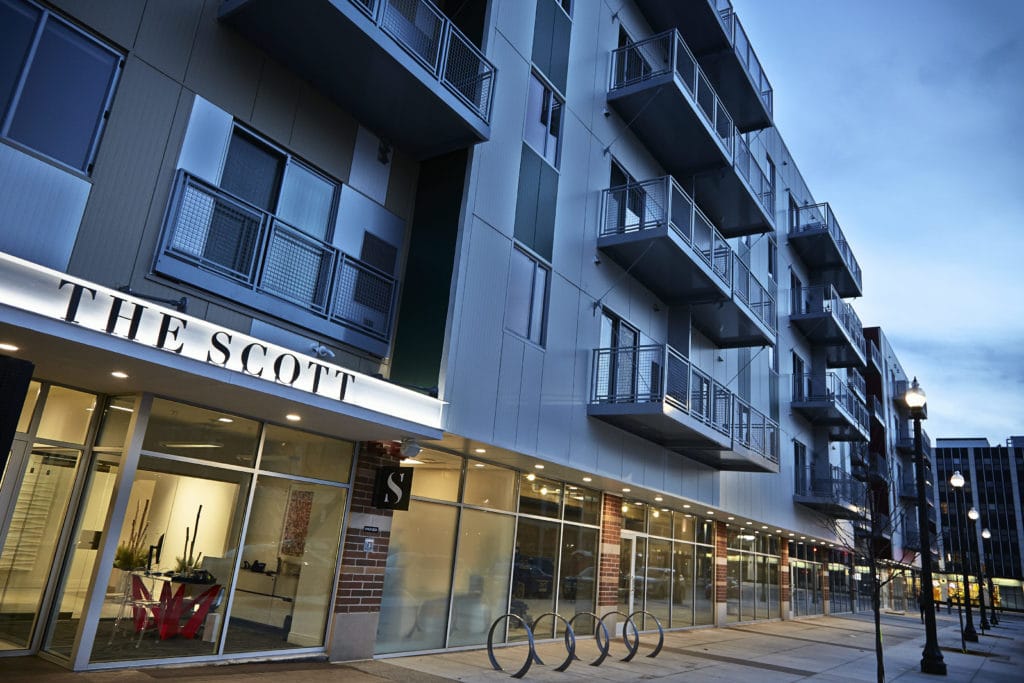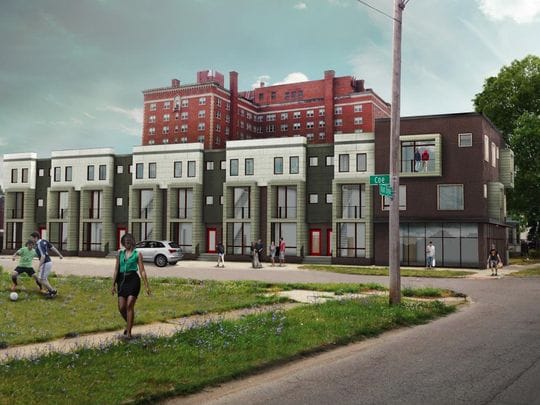Top Story
Name: Clifford Brown
Company: Woodborn Partners
City: Detroit, Michigan
Product Types: Location driven, mixed-use, mixed-income with residential component.
What did you do before you were a developer?
I have over 25 years of experience; I started in banking. Then I did retail lending, and credit commercial lending. I realized that wasn’t part of my life goal, so I went back and got my MBA in corporate investment finance with minors in real estate and marketing strategy. When I left, I started work with Ford Motor Company.
I’ve done a little bit of everything at Ford. Local insurance consolidation for the global operations, through to accounting and manufacturing. I worked at Ford Land as an analyst for 5 million square feet [464,500 sq m] of space nationwide. I worked with a number of property and project managers on tenant buildout, maintenance, improvements, and capital infrastructure buildout.
At that time, I wanted to do work in real estate.
My mother was a social worker and my father was a prison councilor. I don’t come from a family that was independently wealthy, and it’s not like any of them had any experience in real estate. My grandfather owned a funeral home, and at one time he managed some real estate, but that was about it. What it really came down to was a function of working nights and weekends trying to bring the dream of being a real estate developer into fruition.
What motivated you to make the leap into development?
My business partner, Christopher, and I have been lifelong friends. We grew up a few blocks from each other in a Toledo neighborhood called the Historic Old West End, which has more Victorian mansions standing than any other neighborhood east of the Mississippi. Those homes reflect the lives of the people who live in them. Some people lived in Victorians that were in great shape. Other people lived in these homes that were run down, and quite frankly they were house-poor.
We dreamed of changing people’s lives via real estate development. We named our company Woodborn, because every street in our neighborhood ended in -wood: Scottwood, Robinwood, Parkwood. Our dreams were born in the woods. We wanted a constant reminder that regardless of whatever we did, or whatever success we may have, or however challenging it may be, that ultimately our responsibility is to change people’s lives through real estate development.
How does your work fit into the context of Detroit’s recent development?

The Scott at Brush Park is a former Brownfield site just north of downtown Detroit which hadn’t been developed in over 40 years. It is a 199-unit, mixed-use development consisting of studios, one-, two-, and three-bedroom apartments.
We’ve been around since 2009. We’ve really been at work on The Scott at Brush Park since then. That is a 300,000-square-foot [27,900 sq m] facility with 199 apartments, 15,000 square feet [1,400 sq m] of retail, and a 326-vehicle parking garage. It’s in a neighborhood called Brush Park, which is sandwiched between downtown and midtown Detroit.
Just south of the Scott was a downtown area in one of the U.S. cities that we considered to be one of the most important in the country. We looked at this neighborhood, which was largely vacant. There were a number of houses that had fallen into disrepair or no longer existed, and we came across a piece of land.
We worked to develop something there that we felt would have a transformative impact. We can’t take full credit for the transformation in Brush Park. In the time since we’ve been working to get this developed, there was a new Whole Foods built north of us. The Q-Line, the rail line, was built just outside our front door; the Red Wings arena was built catercorner to our building; and a number of other positive things have happened. But we do take some pride in the transformation of that neighborhood based on our ability to show that development can happen.
Could you tell me a bit about the product types you focus on?
They’re mostly mixed-use, mixed income products with a residential component. What we build specifically is really based on the area around the land. So, for example, our smaller project in Detroit, the Coe at West Village, is the first to take what’s happening in midtown and downtown Detroit – where the bulk of development is happening in Detroit – and starting to take it to the neighborhoods.
While that project is smaller, it’s also having a transformative impact because it’s showing developers that you can do ground-up development, within Detroit neighborhoods and do it profitably, and do a high-quality product.

The Coe at West Village, a 12-unit, mixed-use / mixed-income development with 1,200 square feet [111 sq m] of retail opening in September, is the first new development financed by a $30 million fund designed to drive “inclusive economic growth” in Detroit’s neighborhoods.
Where do you turn to get a fresh perspective on or experienced insight into a prospective or existing deal?
I’d say the relationship we have with the principals of Broder & Sachse Real Estate Services. They’ve been extremely supportive from being mentors as we take on projects. We’re a two-man team, but we can scale up and take on significantly bigger projects than a typical two-man team because we can partner with a Broder & Sachse.
Depending on the nature of the project, we can get help from them that way, or we can simply sit down with them and pick their brain and say, “This is what I’m thinking. You have significantly more experience than me in this space. Can you give me your feedback?” We’ve been able to access them 24/7, night and day, and they’ve been phenomenal in that way.
What does being a successful real estate developer mean to you?
Obviously, you need to be able to pay your bills. But if what we do is highly profitable, and we’re not [having an impact on] people’s lives and we’re not focusing on our mission, then we’re not successful. If we’re able to first and foremost maintain a focus on who we are, who we stand for, our belief in helping other people, and we keep doing the right thing while maintaining a financial benefit to make it sustainable, then we think we’ve done the right thing.
We have one core value, and that is being able to go home, look your family in the eye, and say that I did the right thing. And that’s what being a successful real estate developer is.

The Scott offers top-notch amenities such as a resident kitchen and lounge with games and fireplace connected to a year-round patio. It is situated just one block from the new QLine, providing walkable access to Downtown and Midtown Detroit.
What skills or traits do you think are most important to make the leap into real estate development?
It’s funny—that was one of the first questions I asked one of my mentors. His answer was perseverance, and I said, “No, seriously.” [chuckles] But I’ve found in my time that that is it. You are told “No” constantly. It can beat up your psyche. It can beat up your ego. What we’ve found is that our conversations have moved toward, “Don’t tell us ‘No,’ tell us ‘Not yet,'” and we ask, ‘Where do we need to be to get there?’
It’s about self-awareness. If you go into deals and you don’t know where you are and you believe that you are more important than you are, or if you undervalue yourself, then you’re going to leave something on the table. It’s very important to recognize who you are and what you’re bringing to each deal.
What skill or trait did you lack at one point, and how did you overcome it?
Up until this point, I don’t know if we’ve done the best job of self-promotion. For us, we like to let our actions speak louder than our words, but when it comes to entrepreneurs, you do have to self-promote, and you do have to be your biggest cheerleader.
What was a memorable mistake?
With the Scott deal, we got into it with very little cash down. We spent a great deal of time operating from defensive mode. We didn’t have a really strong option or agreement. We had not done a development as a joint entity at that point. A lot of the challenges that came about were because, while we were proactive, we were still in a reactionary mode. It wasn’t until we said, “We’re going to take full control of this, and we have every right and every obligation to drive this thing until we’re successful.”
We were told, and it was our understanding that the landowner owned three-quarters of the land, and we’d done title searches and everything we believed we could do. And we came to know that there was a section of the land [for which] the deed had not been processed yet. It was just a learning experience.
Whom do you most admire?
It sounds corny, but first and foremost it has to be my parents. I’ve got this background in finance, but the very basis of who we are as a business, and who we are as individuals, comes down to how we were raised. In finance, you think risk versus reward is your primary driver, but I was raised by parents always telling me that people are more important than things. So, the very order of things that drives Woodborn Partners to build lives, community, and wealth is driven based off of those lessons that we learned from our parents. People come first. Wealth is at the end because people come first.
About Entrepreneur Profiles
Entrepreneur Profiles are conversations with real estate development professionals who, in most cases, have recently made the leap into the industry whether as young individuals fresh out of school or as mid-career transitions.
With a focus on small-scale developers often doing incremental and transformative work, these are quick and easy to read profiles to raise awareness of these professionals. By telling their stories, the Urban Land Institute hopes to inspire the next generation of small scale entrepreneurs to transform their own communities. See the most recent Entrepreneur Profiles.